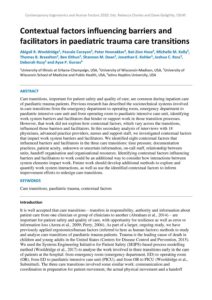| Document | Author Abigail R. Wooldridge, Pascale Carayon, Peter Hoonakker, Bat-Zion Hose, Michelle M. Kelly,Thomas B. Brazelton, Ben Eithun, Shannon M. Dean, Jonathan E. Kohler, Joshua C. Ross, Deborah Rusy and Ayse P. Gurses |
| Abstract Care transitions, important for patient safety and quality of care, are common during inpatient care of paediatric trauma patients. Previous research has described the sociotechnical systems involved in care transitions from the emergency department to operating room, emergency department to paediatric intensive care unit and from operating room to paediatric intensive care unit, identifying work system barriers and facilitators that hinder or support work in those transition processes. However, that work did not explore how contextual factors, which vary across the transitions, influenced those barriers and facilitators. In this secondary analysis of interviews with 18 physicians, advanced practice providers, nurses and support staff, we investigated contextual factors that impact work system barriers and facilitators. We identified eight contextual factors that influenced barriers and facilitators in the three care transitions: time pressure, documentation practices, patient acuity, unknown or uncertain information, on-call staff, relationship between units, handoff organisation and organisational resources. Identifying contextual factors influencing barriers and facilitators to work could be an additional way to consider how interactions between system elements impact work. Future work should develop additional methods to explore and quantify work system interactions, as well as use the identified contextual factors to inform improvement efforts to redesign care transitions. |

